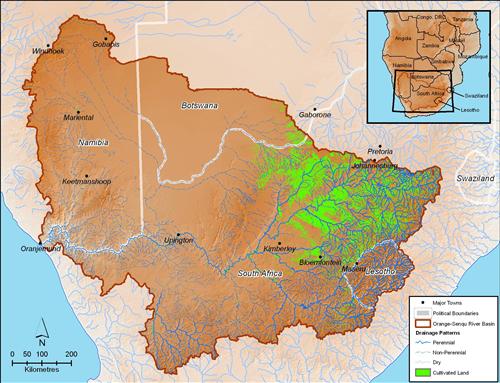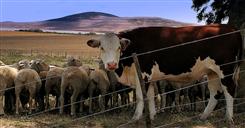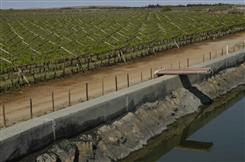Due to long dry seasons and unreliable rainfall, farmers have had to resorted to irrigation to provide sufficient water for agricultural production in the drier parts of the basin. In the southern Africa region, about 70 % of freshwater extracted from rivers and aquifers is used for irrigation, and in most of the region there remains a large area of land suitable for irrigation. The total irrigation water use for the four basin countries is shown in the Table 1 below. Table 1 shows the total demands for irrigated agriculture from all sources of water in the basin countries, not just from the Orange-Senqu River basin. Table 2 (by Lange et al. 2007) only gives values for water abstracted from the Orange-Senqu River basin and in the case of South Africa water demand from the Vaal River is not included.
Table 1: Irrigated agricultural demand of the four basin countries.
|
Country
|
Irrigated Agriculture Demand (Mm3/a)
|
% of Total Use
|
|
Botswana
|
60
|
43
|
|
Lesotho
|
10
|
19
|
|
Namibia
|
170
|
62
|
|
South Africa
|
11 120
|
73
|
Source: Cooper et al. 2004

Distribution of cultivated land in the Orange-Senqu River basin.
Source:Hatfield 2009
( click to enlarge )
In a report on the Orange-Senqu River basin by Lange et al. (2007), water use by type of agricultural activity for each basin state was estimate as shown below.
Table 2: Orange-Senqu River basin water use by country and sector of the agricultural industry in the year 2000 (Mm³).
|
|
Lesotho
|
South Africa (Upper and Lower Orange River)
|
Botswana(groundwater only)
|
Namibia (Surface Orange River only)
|
|
Agriculture, forestry and fishing
|
19,27
|
1 828
|
0,51
|
42,78
|
|
Crop Agriculture
|
0,40
|
1 757
|
—
|
42,78
|
|
Grapes
|
|
|
—
|
31,69
|
|
Other horticulture
|
|
|
—
|
6,49
|
|
Lucerne
|
|
|
—
|
1,04
|
|
Cereal and other crops
|
|
|
—
|
3,56
|
|
Livestock
|
18,87
|
71
|
0,51
|
—
|
|
Commercial
|
|
|
—
|
—
|
|
Traditional
|
18,87
|
|
—
|
—
|
Adapted from Lange et al. 2007
— indicates 0
blank indicates no data available.
 Livestock account for the majority of Lesotho's agricultural water use. Source:Lollie-Pop 2005 ( click to enlarge ) |
 Irrigated agriculture is the dominant water user in the basin. Source:Vogel 2009 ( click to enlarge ) |
